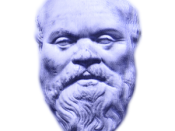In his writings on Early Christian Ethics, Thomas Aquinas proposed the existence of four distinct types of laws. These laws are eternal, natural, human, and divine. Aquinas defines eternal law as that which orders everything in the universe. It is a cosmos which issues from the will and wisdom of God. He defines natural law as a subset of eternal law. He states that the natural law is the location for the fundamental principles of morality, and we come to the natural law through conscience and reason. Essentially, Aquinas incorporates Aristotle's ideas of practical wisdom and reason, incorporates them into his natural law, and states that the natural law comes from God. This gives ethics a divine grounding. Aquinas explains human law as customary laws which vary from place to place based on customs or values. An example of this is the punishment for stealing which is different in some regions than others.
According to Aquinas, divine law is that which we see not through reason, but through revelation. An example of divine law would be the existence of heaven and hell. Human's could not possibly reason the existence of heaven and hell, so they can only learn of it through God's revelations in the Bible.
Vernon Bourke analyzes Aquinas' moral psychology because he believes that it is an important basis for the Aquinas' entire philosophy and that it was an essential component of Aquinas' bringing Aristotelian ideas to the Christian world view. Bourke states that Aquinas' moral psychology can be broken down to three distinct human functions. The first function is intelligence. Bourke defines Aquinas' view of intellect as the ability to comprehend "universal meanings" of the experience, and the capacity to reason conclusions from this experience. This concept is very similar to Aristotle's concept of practical knowledge which...


